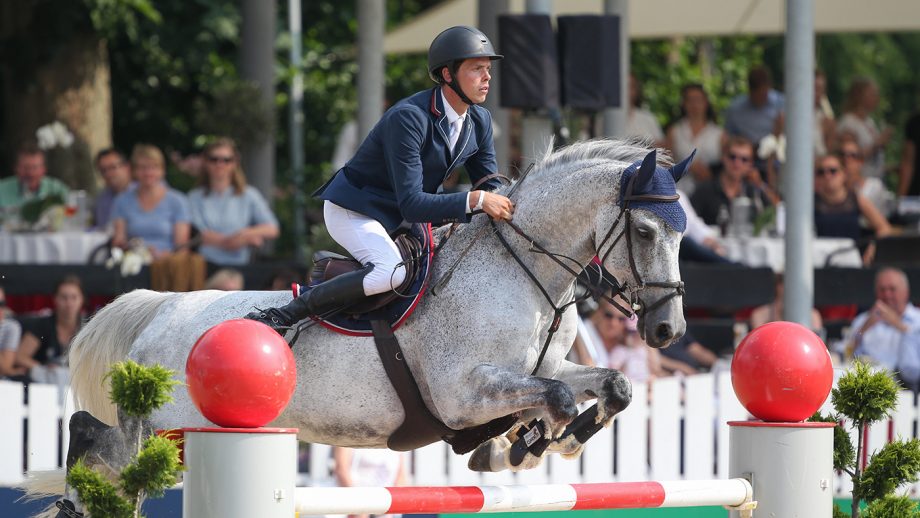After the first Nexgen young horse finals, H&H finds out about the different young horse competitions in Britain, talking to series organisers and riders about the differences and benefits
THE choice of opportunities for youngsters in the UK has been praised for educating future top horses – but it has been agreed owners and riders need to look at horses as individuals and not rush them.
New to the calendar for 2020, the Nexgen series held its finals at Hickstead last week (15–16 September) for four- to six-year-old horses in dressage, eventing and showjumping.
The series joins other events on the calendar including the British Dressage young horse championships, the age finals at the British Showjumping national championships, the British young horse championships at Bolesworth, the British Eventing (BE) young horse championships at Osberton International Horse Trials, and the Burghley Young Event Horse series.
Nexgen co-organiser Victoria Wright told H&H age classes are important for providing the foundations for “good quality young horses” in their competition careers.
“We want to find horses we think are going to go all the way to the top levels. The classes are there to give them the education they need to learn to cope with that atmosphere,” she said.
“It’s fantastic that the individual disciplines have their own championships and we certainly don’t want to take anything away from those but what we felt was missing was a UK equivalent of the Bundeschampionate in Germany, where you bring together the best young horses in the country from the three Olympic disciplines in one place to showcase what quality we have in the UK.”
Ms Wright added that the organisers hope to grow the series with the hope of holding a young horse festival in the future.
“We’re already planning dates for next year and the final will be at Hickstead again. We are possibly going to bring in seven-year-olds and we’re looking at bringing in the Hickstead main arena to really go for a Bundeschampionate-type format.”
Dressage rider Darren Hicks, who was second on Woodcroft Django Mon Ami in the Nexgen six-year-old final won by Sadie Smith on Jaguar I, told H&H there is a “huge place” for young horse classes but that it is important each horse is ready for that level.
“The classes are really important to get horses into a bigger environment. You don’t know how they’re going to be in the ring when they’re young and it’s really nice when they go well and the judges like them,” he said.
“But there’s a fine line between overproducing and keeping them confident; you’ve got to make sure they’re happy with what they’re doing and that they’re strong enough. I’ve got many young horses at my yard but some I wouldn’t take out yet as I don’t think they’d be ready enough and they’re maybe more for the future. The ones I do normally take are fairly confident in themselves, strong in the body with natural movement. It’s down to the rider knowing whether that horse is suitable.”
More choice
Eliza Stoddart, winner of the six-year-old Nexgen eventing final with her gelding Codebreaker, told H&H the addition of the series gives riders more choice for young horses. Last year, the combination took the five-year-old title at the BE young horse championships and were seventh in the Burghley Young Event Horse five-year-old final.
“Having the choice allows us to make good decisions for each individual horse,” said Eliza. “You might have one owner say they want their horse at Burghley because maybe they’ve always traditionally done that, but Nexgen is on surfaces so you can guarantee your horse is going to have good footing. Then there’s an argument that the five-year-old classes qualifying for Osberton prepares them for their six-year-old year at novice.
“We don’t want to hammer young horses, it’s really important they have a slow progression and each horse is treated as an individual.”
Burghley director Elizabeth Inman told H&H the event’s age classes look for horses who have been correctly produced at that stage.
“We look for something very different from our four- to our five-year-olds – the four-year-old qualifiers start late spring and obviously if you have a four-year-old doing that sort of work, you’re almost potentially working a three-year-old,” she said. “It’s very important that mentally and physically they’re allowed to develop, so from Burghley’s perspective we’re not looking for anything that’s been rushed through – we’re looking for potential talent.
“It’s good there are different opportunities [for young horses] but it’s up to the owners, riders and breeders to utilise them in a way that’s best for the horse.”
You might also be interested in…

Young horses rise to the Hickstead challenge with Nick Skelton a winning owner *H&H Plus*

Virtual Burghley Young Event Horse final goes global
‘We are delighted to provide owners and riders with a competition in this unusual year’

Oliver Townend scores final win on Cillnabradden Evo at Burnham Market: ‘He‘s very special’ *H&H Plus*
Find out how the final day of action concluded in the CCI4*-S at Burnham Market – and why this was

‘Identical’ twin event horses both win on the same day
Both six-year-olds finished on their dressage scores, just 0.2 penalties apart

Concern over more lenient approach to riders’ recreational drug use *H&H Plus*


